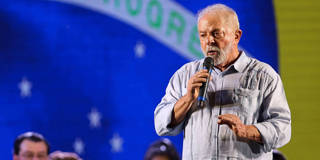Following his shocking election in 2018, Brazilian President Jair Bolsonaro clearly hoped to benefit from a profound rightward shift around the world; and for a while, he did. But when voters head to the polls next month, they are likely to tell Bolsonaro that they have seen enough.
FARMVILLE, VIRGINIA – On September 20, Jair Bolsonaro, Brazil’s far-right president, gave what will most likely be his final address to the United Nations General Assembly in New York City. Since 1955, Brazil has always gotten the first word at the UN’s annual meeting, simply because, as UN Chief of Protocol Desmond Parker told America’s National Public Radio in 2010, “in very early times, when no one wanted to speak first, Brazil always…offered to do so.”
Of course, this custom can sometimes be hard to justify. After all, nobody really wants to hear from Bolsonaro, who has become mostly friendless on the world stage, shunned after his calamitous handling of COVID-19, consistent attacks on democratic procedure, and rank sexism, racism, and homophobia. Worse, Bolsonaro shamelessly used the UN’s podium this year to campaign for re-election.
With an eye toward animating his political base back home before the first round of the presidential election on October 2, Bolsonaro touted his efforts to undo the legacy of the left-wing administrations that had preceded him. At the same time, he said what he thought the assembled foreign diplomats and dignitaries wanted to hear, paying lip service to “sustainable development,” “human rights,” and other concepts that have never figured anywhere on his administration’s agenda.

FARMVILLE, VIRGINIA – On September 20, Jair Bolsonaro, Brazil’s far-right president, gave what will most likely be his final address to the United Nations General Assembly in New York City. Since 1955, Brazil has always gotten the first word at the UN’s annual meeting, simply because, as UN Chief of Protocol Desmond Parker told America’s National Public Radio in 2010, “in very early times, when no one wanted to speak first, Brazil always…offered to do so.”
Of course, this custom can sometimes be hard to justify. After all, nobody really wants to hear from Bolsonaro, who has become mostly friendless on the world stage, shunned after his calamitous handling of COVID-19, consistent attacks on democratic procedure, and rank sexism, racism, and homophobia. Worse, Bolsonaro shamelessly used the UN’s podium this year to campaign for re-election.
With an eye toward animating his political base back home before the first round of the presidential election on October 2, Bolsonaro touted his efforts to undo the legacy of the left-wing administrations that had preceded him. At the same time, he said what he thought the assembled foreign diplomats and dignitaries wanted to hear, paying lip service to “sustainable development,” “human rights,” and other concepts that have never figured anywhere on his administration’s agenda.